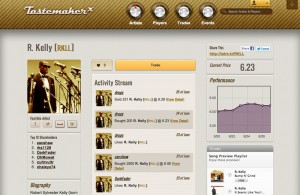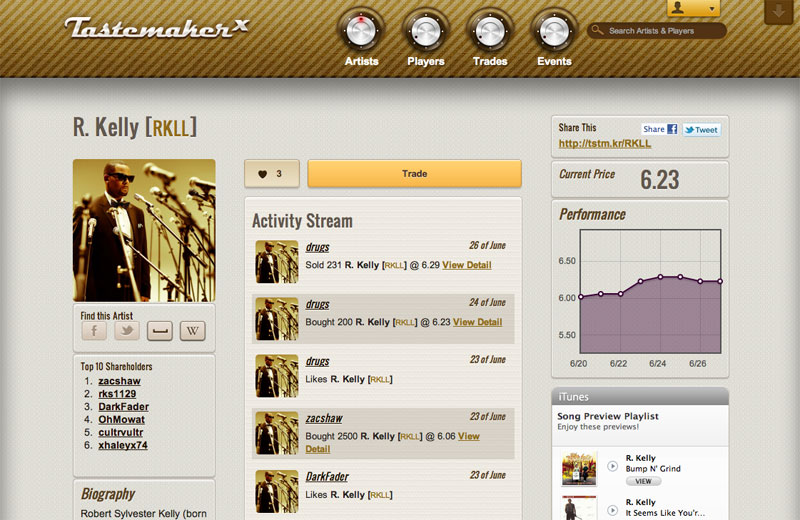 Note: This was posted as a response to David Lowery’s Letter to Emily White, which was in response to her article “I Never Owned Any Music to Begin With”. White is an intern at NPR’s All Songs Considered, Lowery is a contributor for The Trichordist, a technology and ethics blog.
Note: This was posted as a response to David Lowery’s Letter to Emily White, which was in response to her article “I Never Owned Any Music to Begin With”. White is an intern at NPR’s All Songs Considered, Lowery is a contributor for The Trichordist, a technology and ethics blog.
As a musician and huge music fan, your emotional plea for our generation to renounce Free Culture so that musicians can make a living was indeed stirring. But beyond the choir you’re preaching to, we both know it’s falling on deaf ears. Asking today’s music consumers to kindly start paying for recorded music again because it’s the ethical thing to do isn’t only unviable — it’s not the ethical thing to do anymore. Free Culture is an ethic, and I think I can speak for my generation when I say we believe it to be the high ground over the way the music industry used to be run.
Your heart is clearly in the right place. But unlike you, I think most of us, our generation included, have a deep, unwavering motivation to compensate the musicians who enrich our lives. Here’s the crux of our disagreement: You claim listeners aren’t paying as much for access to music anymore because they’re unethical and no longer find it important to compensate artists. You and many others make this accusation over and over again without providing any clear evidence other than unconvincing anecdotes.
I believe the opposite can be clearly proven: Today’s musicians are held in higher esteem by listeners than ever before, and it’s the industry that has lost their respect (and money), due to a history of unethical behavior. The first point is proven by the sheer unprecedented volume of music now being consumed. The latter point is proven by even a casual glance into the history of the music industry.
Should listeners feel guilty for having free access to music? Of course not. It’s the best thing ever to happen to a music lover. Sometimes I wonder if all the Free Culture-haters are just jealous that they had to pay $20 per CD. You realize that price point had nothing to do with compensating artists, right? That ridiculous number was the product of illegal price fixing, obscene recoupments, payola, unethical ‘breakage’ fees and keeping statutory royalty rates for artists low, to name just a few reasons. Meanwhile, our generation experiences the ecstasy of free or near-free access to the global jukebox.
Should musicians feel threatened by listeners accessing their music for free? Only if their entire business model is based on forcing their fans (and potential fans) to pay for access to music. This is a model that our generation is using technology to reject. The exposure granted by free access to music is exactly what most musicians are after. Free exposure is only a lost profit opportunity for the minority of musicians who succeeded in the pre-digital record business paradigm. Most of the time musicians didn’t profit beyond statutory royalties anyway, because they could never recoup the cost of marketing and advertising. Now good music goes viral for free, and even generates ad revenue for the creator!
I’m going to level with you. You and many other Free Culture detractors are people from social circles with musicians that did well in the past but whose revenue dropped dramatically along with industry profits. I think the driver behind this blithely unrealistic “let’s go back to the way things were in the 90s” movement is pretty straightforward — you tasted profits from a business model that is no longer sustainable. You want your industry back.
We don’t.
Consider for a moment how were the profits of the “old” music industry won: By subjecting listeners and musicians — and indeed, our very culture — to a laundry list of horrendous commercial exploitation. Price fixing, payola, unpaid royalties, market monopolies, ticket surcharges, obscenely exploitative record contracts, manufactured popularity, censorship, perpetual copyright and destruction of fair use and the public domain… the list goes on and on. In short, the old way of doing things sucked and we don’t care if a few of that era’s successful artists no longer get mailbox money for music they recorded decades ago. We certainly don’t care if the record industry, which enabled these injustices, dies a slow, public death.
On the other side of the Free Culture argument, you have people like me: unsuccessful musicians and frustrated music fans. We are by far the majority, but our apathy is high. Critically, this does not translate into consumer apathy for compensating musicians. Quite the contrary, our apathy for corporations is driving a new appreciation for the original creators and producers of music, based on free access to recordings.
I believe my story is somewhat typical of the unsuccessful musician. After years of false starts and bad management I finally “made it” and got signed to an emerging indie. The advance was small, the recoupment high. But we had a great booking agent, nationwide tour support and opened for big bands in NYC. We got a sync license with MTV and some film placements. We had a high-powered manager and one of Britney Spears’s lawyers. Our friends were signed to Capitol, Sony began showing interest in us. We were on the cusp of making a living playing music. But while our fan base was rabid and widespread, it just wasn’t big enough. It wasn’t just a matter of “exposure” as most musicians whine. The business of the band didn’t scale, and eventually petered out. While I never quit playing music or trying to make a business of it, music became more of a hobby and I was now among the vast ranks of unsuccessful musicians.
Guess who was pissed (besides our band)? Our fans. Having supported us all those years, they now saw the apparatus of the music industry whittle away our faith in the business of our band to the point where we quit. It’s easy to look over this fact, but it’s critical not to: Music fans talk to musicians, and most musicians have historically not been happy with the way the industry worked. It wasn’t that we had bad music or bad management — our fan base just wouldn’t scale big enough to support our business team. I can see why those who succeeded in the past want to protect the old business model. It strongly favored the incumbents and built a nearly insurmountable barrier of entry that the average musician had little chance of scaling.
For both musicians and listeners, failure was the common narrative of the record industry. We sat and watched our friends write great music people loved, yet they were unable to make a living doing so, even and especially after they were signed. We saw the rare few musicians who truly made it big falter in the excesses of the industry, becoming drug addicts as the drive for manufactured popularity hollowed out the meaning of their music. Add to that the aforementioned widespread industry corruption. Factor in decades of consumers buying albums of mediocre music for one or two good singles. Pile on a digital distribution cost of near zero. Put a recording studio in every home with a computer. Lastly, drop the RIAA suing music fans for sharing music as the cherry on top, and there you have our generation’s hatred of paying for access to music.
If there is an ethical dilemma here, clearly it is your generation’s music industry, not our generation of listeners, that must bear the brunt of the blame.
I appreciate your statement that “on nearly every count [our] generation is much more ethical and fair than [your] generation”, but I don’t understand why you’d single out musician’s rights as something we specifically don’t respect. After such praise, a claim like that just seems silly.
Free Culture opponents often suggest technology somehow caused our generation’s desire for compensating musicians to evaporate. But it was clearly the corruption and ineptitude of the industry itself that is to blame for this negative attitude toward paying for music. Digital music technology provided the opportunity musicians and listeners have been waiting decades for — to balance the industry’s unchecked power, and maybe eke out a more sustainable living in the process.
Fans formerly had no apparatus to directly compensate artists. Now that they have tools like Kickstarter and Bandcamp, we’re seeing millions of dollars pouring directly into musician’s pockets. This represents a fraction of the so-called “lost value” of paid access to music, but given all the money and lobbyists the old industry has thrown at and against digital music innovation, it’s remarkable nonetheless.
That’s the thing about asking our generation to fix the record industry. We’re already doing it. We’re connecting artists directly to fans and bringing back patronage, a far less exploitative model that is emerging as the foundation of the new music career. We’re using crowdfunding to finance our work. We’re using digital tools to democratize distribution and licensing, with fairer publishing deals. Instead of basing our entire career on one album dropping or flopping huge, we’re ditching the LP in favor of a steady stream of singles, what fans really want. Apps are the new album. Production is going more lo-fi but is becoming more diverse and original in the process. These are the viable solutions I was talking about earlier. It’s all actually quite liberating because none of it involves being exploited by the music industry, and if it does, it’s certainly far less than in the past.
And yes, we’re selling T-shirts. I wouldn’t have to sell ‘em if I had a dollar for every time I heard, “your music is free, so what, you’re going to make a living selling T-shirts?” But the profit margin is good and they’re moving off the merch table like CDs used to. You have to realize that when the physical media that holds the music is no longer a profitable product, there are myriad replacements which tie the music to a physical product that can be profitably sold. The critical thing to realize here: the devaluation of the music recording increases the value of merch for the artist. Our fans are gonna spend $10 at our merch table anyway — should we sell them a T-shirt they will wear everywhere for a 150% markup, or should we sell them a CD they’ll burn and shelve for the statutory rate of 9.1 cents per song?
Besides selling recorded music, there are dozens of revenue streams for us to pursue. Many are accessible to musicians directly for the first time thanks to the democratizing effect of digital technology. For you to blame technology for unfair artist compensation is odd, for it was unethical industry dominance over the technology of vinyl, radio, cassettes, CDs and the overall apparatus of distribution that created the record business in the first place. The only difference with today’s technology is that the exploitation-crazy record business doesn’t yet have a stranglehold on it. Whether musicians succeed or fail is now up to the musicians and the fans themselves, not the industry.
So when you ask my generation to fix the music industry, we shrug our shoulders — but not out of apathy for music or musicians. We know the music industry sucked and can be better, so we’re not going to support the old way of doing things. We are at a crossroads. There will be a period of hardship and confusion. But don’t tell me we ethically don’t support artists. We listen to vastly more music than your generation ever did. We like, on average, a greater diversity of music than your generation ever did. And we’re still spending money, we’re just being attentive to where it’s going. We want to compensate the musicians, not the industry. It’s not only our choice, but our cause and our fight. The industry is throwing all the money, lobbyists and lawyers it can toward legally protecting its right to intermediate the direct fan-to-artist connection we have sought for decades and finally hold in our hands. We’re not going to allow Free Culture detractors to let that slip away just so they can collect royalties and recoup advances on music made in a bygone era.
We’d love to solve the music industry — really, we would — but we kind of need to save our culture first. Not incidentally, we believe artist compensation as critical to saving our culture. Pining for the old days when we enriched entertainment conglomerates instead of technology conglomerates? Who cares which industry is trying to co-opt our culture today, let’s take as much control as we can while technology affords us the opportunity.
I hear lots of crying about the traditions of the old business model, from the beauty of album art to the selling of millions of records. But you know what’s really sad? It will only be a few years before the entertainment conglomerates including the “Big 4″ record labels (or soon to be “Big 3″, how fair is that?) push back against the technology industry with a SOPA, PIPA or CISPA-like bill that passes into law. By then it will be too late and we’ll be crying over a lot more than our lost free access to music. Our culture may be lost in the unsustainable abyss of capitalism run amok if we the people lose too much control over technology during this critical transition.
I think I speak for most musicians when I say I’m going to make the best music I can until the day I die, and that money only determines how much time I can dedicate to that pursuit. There are way too many other musicians out there getting exposure for me to even entertain the argument that the current environment dissuades one from being a musician. I have a $1,000 studio in my basement that would have cost $100,000 a decade ago. I can make and distribute an album for free, and crowdfund a basic living doing nothing but music if I can generate at least 1,000 fans who spend $50/year with me on average (many $20 supporters and a few big backers). All I need to do is write a year’s worth of good music. With fifteen years as a musician under my belt I think I can manage.
(Not incidentally, I have other life skills I am employing to make my living, which is a very underrated issue in and of itself. What percentage of your income must be derived from music to be considered as “making a living playing music?” What about those whose non-music careers enable their music success, like website designers or audio engineers? If you manage a great music career, are you a successful musician or a successful manager? Furthermore, aren’t we all musicians? Most of us have the ability to make music but just don’t practice. Instrument and recording equipment sales are on the rise, so musicianship must be too. Everyone is already a DJ, how long before listeners are considered musicians? But that’s a subject for another article…)
It’s obvious this new music industry is crappy for scaling a band into a big blockbuster. But we are slowly getting over the rock star trip. The new music industry helps numerous smaller bands scale into moderate success. As the success stories mount, fans are starting to believe in supporting music again. Try to tell Amanda Palmer or her 24,883 fans who collectively raised $1.2 million dollars on Kickstarter that the old way of doing things was better. Then realize her story is becoming less of an exception with each passing day.
All this talk about not being able to make a living as a musician is nothing new at best. At worst, it’s dangerous, because it perpetuates the myth that only through charging access to music can one have a music career. It’s that myth that is keeping us from entering a new golden age in music. Emily White was simply telling us the truth. Come on, you know she would not have written the article if she didn’t care about compensating musicians. She works for freakin’ NPR on a show that regularly breaks new acts. It’s time to look inward and consider that Free Culture is our generation’s reaction to the ethical failings of your generation’s music industry.
 Writing has been heady and traffic has been heavy on the blog this week. I’ve been fully engaged in this David Lowery vs. Emily White debate as it goes viral. Boing Boing has a great wrap-up of rebuttals and of course you can check out my original piece here.
Writing has been heady and traffic has been heavy on the blog this week. I’ve been fully engaged in this David Lowery vs. Emily White debate as it goes viral. Boing Boing has a great wrap-up of rebuttals and of course you can check out my original piece here.


 Note: This was posted as a response to David Lowery’s
Note: This was posted as a response to David Lowery’s